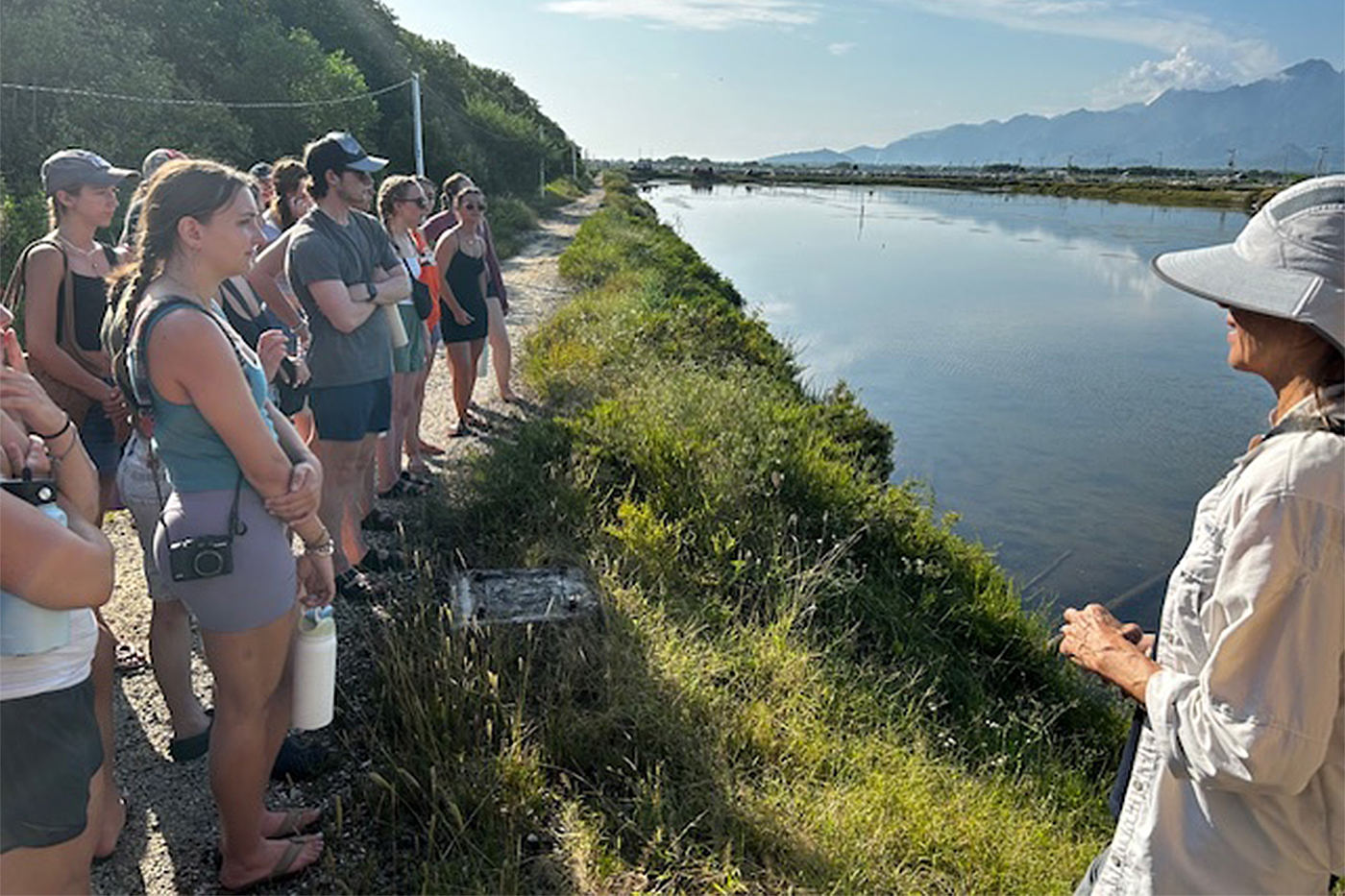Students on a Dialogues of Civilization trip to Indonesia witnessed both the stark realities of climate inequality and the powerful grassroots innovations helping island communities adapt to climate change.
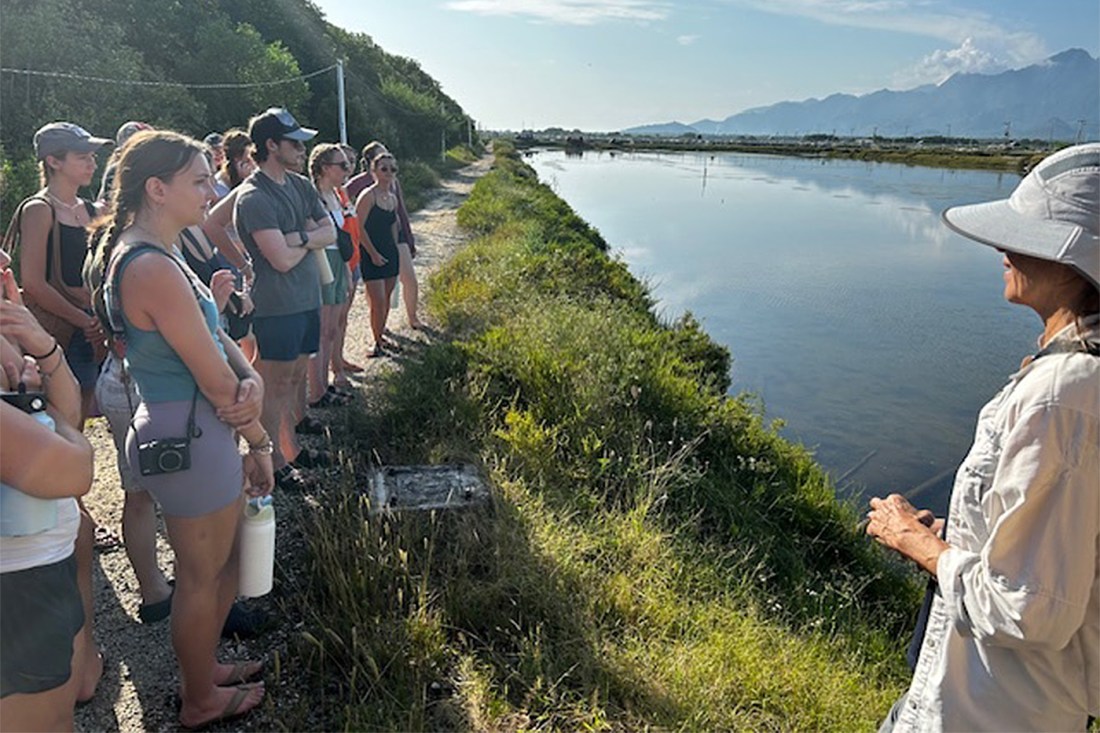 Students in Nichola Minott’s course studied the unequal ways that climate change is effecting island nations like Bali, one of more than 17,000 islands in Indonesia’s archipelago. Courtesy Photo
Students in Nichola Minott’s course studied the unequal ways that climate change is effecting island nations like Bali, one of more than 17,000 islands in Indonesia’s archipelago. Courtesy Photo
As part of a Northeastern University Dialogues of Civilization course this spring, Odessa Sanchez traveled to Indonesia to study how small island states confront climate change.
But nothing prepared her for the mountain of trash in Bali that dozens of families call home.
Sanchez, a senior international relations major, was one of 24 students in the course, “Small Island States: Climate Change Vulnerability, Adaptation and Resilience,” who visited the Suwung landfill — known locally as “trash mountain.”
There, they watched children scavenge through piles of waste, collecting plastic bottles to sell.
“You have a 2-year-old child picking through trash,” Sanchez says. “There are multi-generational families living in these dumps, and that’s their livelihood.”
Side by side with poverty are the Balinese organizations implementing innovative strategies to cope with pollution and climate change — strategies that the students spent five-and-a-half weeks exploring deeply.
From providing hotels with equipment to compost food waste to supporting small farmers to filter waste water for irrigation, nongovernmental organizations on Bali are attacking environmental issues from all sides, says Northeastern student Liam Cmok Kehoe, who is pursuing a master’s in environmental science and policy.
“These people are already dealing with so many different crises,” Kehoe says, “and they’re able to think one step ahead and come up with solutions, often nature-based solutions, that will enable them to have some climate adaptivity.”
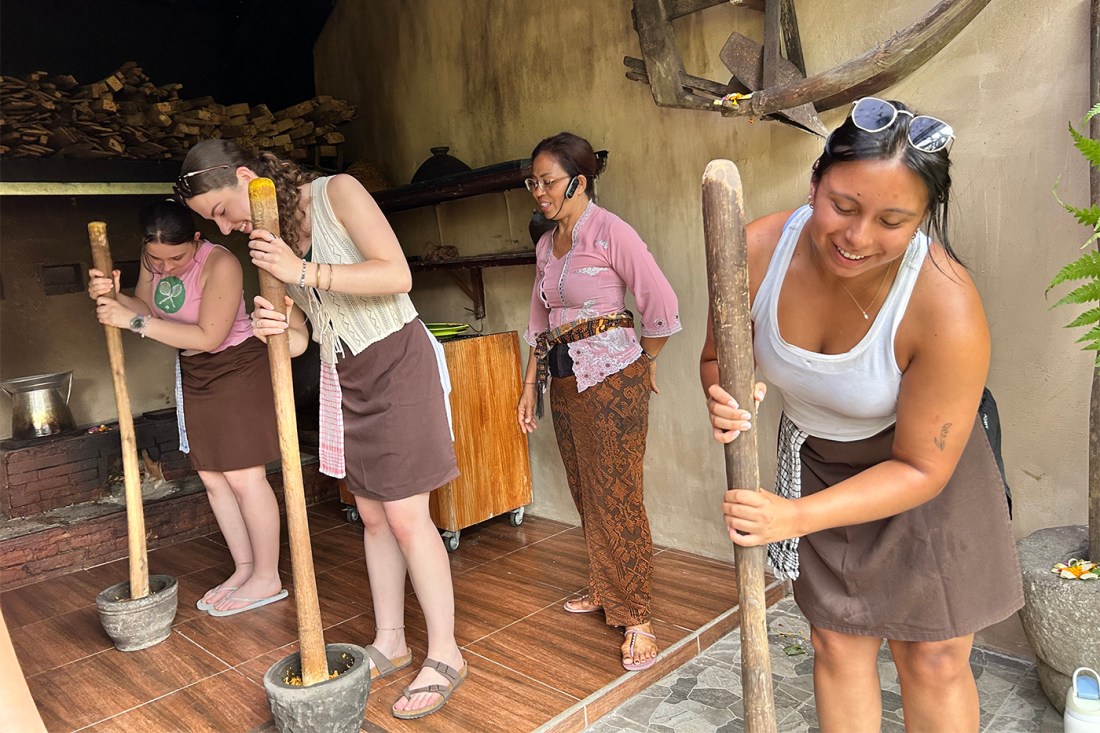
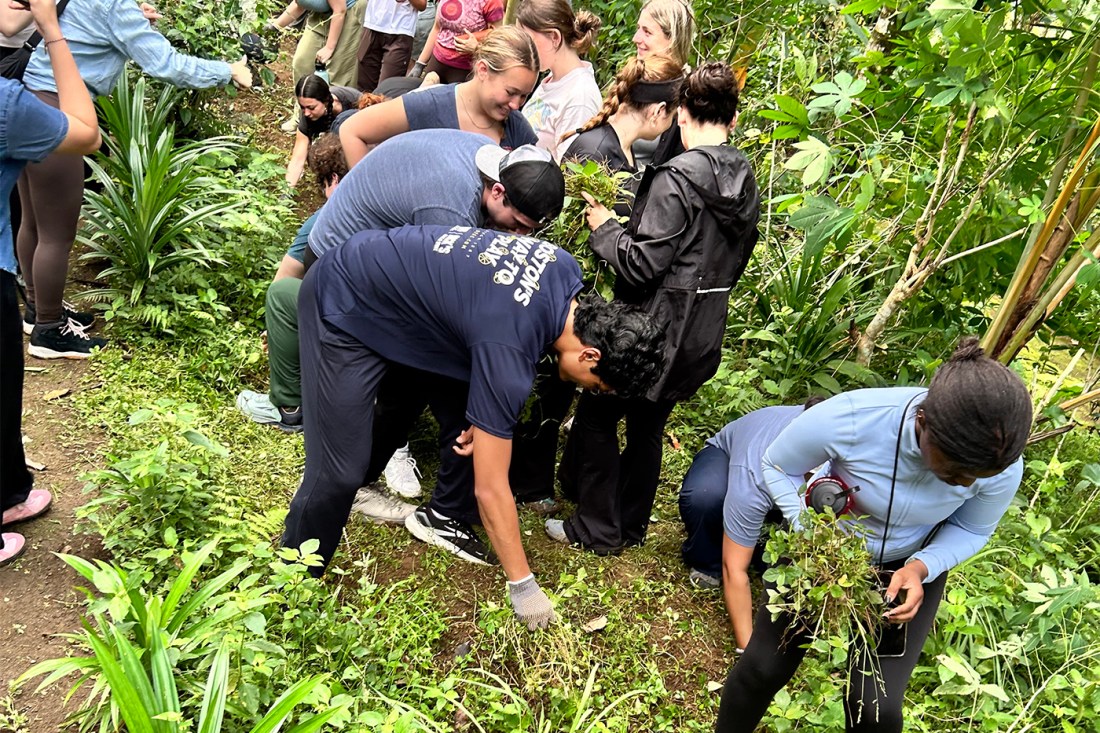
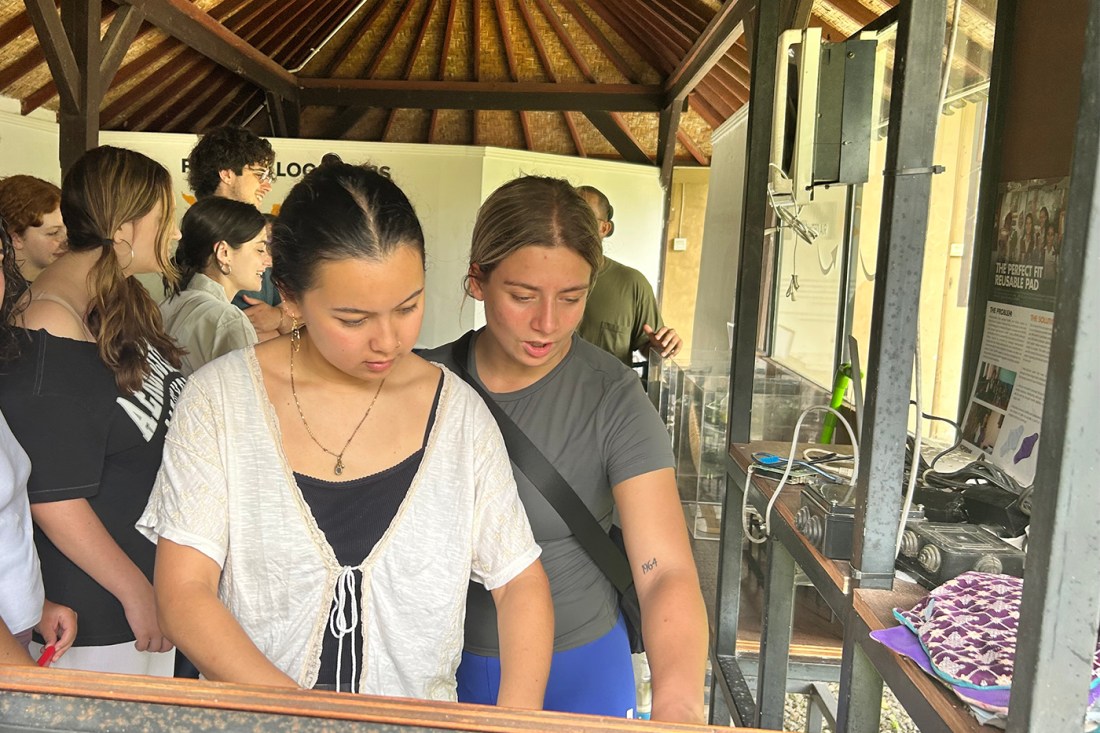
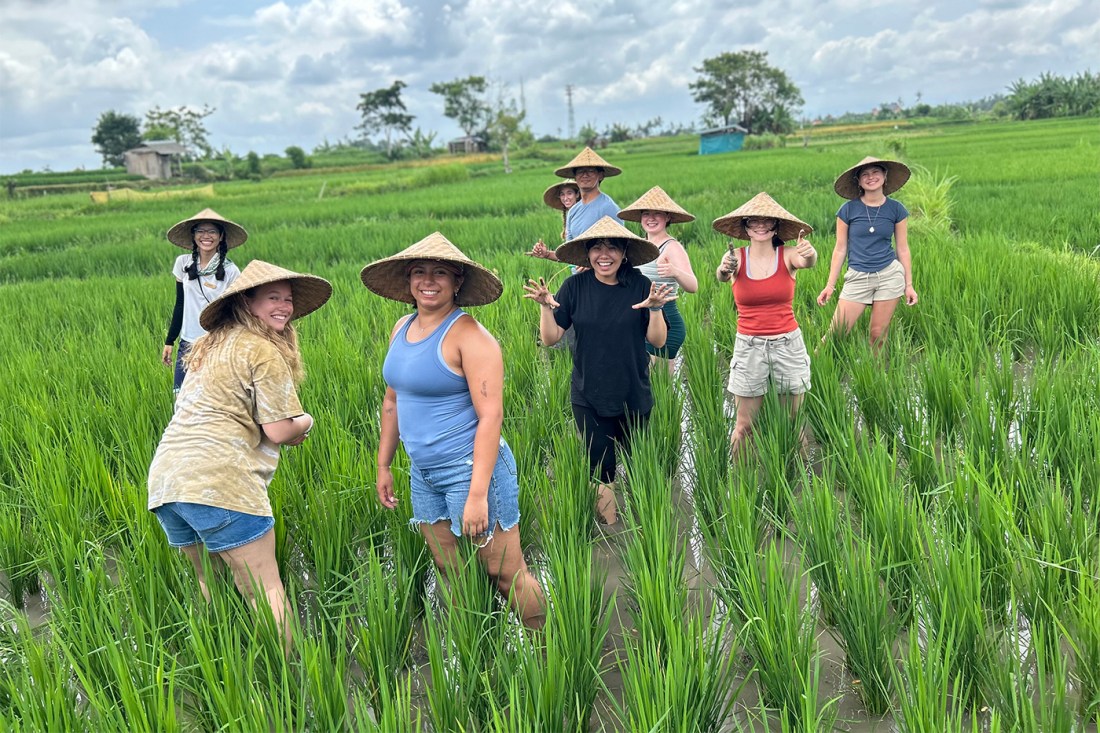
Trash invades many of Bali’s rivers and forests. Northeastern University students learned how Balinese organizations are addressing pollution by cleaning mangrove forests and planting young trees. At a rice farm students studied natural pesticides, used to detract pests without killing them. Courtesy Images
Led by Nichola Minott, an associate teaching professor of international affairs at Northeastern, the course was divided into two parts. In the first, students examined how climate change disproportionately affects island nations. According to the World Meteorological Organization, rising sea levels and other consequences of warming ocean waters threaten the very existence of Pacific islands — including the more than 17,000 islands that make up the Indonesian archipelago.
Minott’s course explored the inequities of how global policy is developed and “who reaps the benefits and who reaps the disadvantages as it relates to the environment and environmental harms,” she says.
“The course leaned heavily into the issues that small island states have as it relates to the environment and climate change,” she says, “and leaned very much into justice and how inequality plays a role in these countries.”
While this was the first time this Dialogues course was offered, Minott has a long history of working in Indonesia. As a doctoral student, she spent more than six months studying the impact of the 2004 Indian Ocean earthquake and tsunami on a 2005 peace agreement between the Indonesian government and the Free Aceh Movement in northeast Sumatra, where an insurgency had been ongoing since 1976.
“I definitely felt a familiarity just from being there, but culturally Bali is a completely different animal to Aceh,” she says. “I was learning along with them.”
For the second half of the course, the focus narrowed to Indonesia — Bali in particular — and how local communities are responding to environmental challenges. With support from the Bali Institute, Minott arranged a series of site visits where students engaged directly with the work of nongovernmental organizations, including seed banks tackling food insecurity and one group working to combat a major issue on the island: food waste.
Heavily reliant on tourism, Bali is home to thousands of hotels, mostly along the island’s southern coast. Magi Farm provides hotels and restaurants with Black Soldier Fly larvae, which eat twice their body mass every day, turning leftovers into nutrient-rich compost.
“The hotels are producing less waste, but they also get compost out of it and then they could put that into their gardens,” Sanchez says. “We learned not only circular economy, but also that in order to create a more sustainable life or living, you have to incorporate that circle.”
The abundance of innovation in Bali — centered on environmental issues and social inequities — left a strong impression on students in the course. Liam Kehoe, director of the Green Initiatives Board within Northeastern’s Student Government Association, says he gained a deeper understanding of resilience in the face of environmental threats than he ever anticipated.
“That’s really left an impact on me,” he says, “just seeing how far ahead their response is.”
Recent Stories
*{margin-block-start:0;margin-block-end:0;}.wp-container-core-group-is-layout-0f4c6871 > * + *{margin-block-start:var(–wp–preset–spacing–40);margin-block-end:0;}.wp-block-gallery.wp-block-gallery-3{–wp–style–unstable-gallery-gap:var( –wp–style–gallery-gap-default, var( –gallery-block–gutter-size, var( –wp–style–block-gap, 0.5em ) ) );gap:var( –wp–style–gallery-gap-default, var( –gallery-block–gutter-size, var( –wp–style–block-gap, 0.5em ) ) );}.wp-container-core-group-is-layout-aaffb961 > :where(:not(.alignleft):not(.alignright):not(.alignfull)){max-width:832px;margin-left:auto !important;margin-right:auto !important;}.wp-container-core-group-is-layout-aaffb961 > .alignwide{max-width:832px;}.wp-container-core-group-is-layout-aaffb961 .alignfull{max-width:none;}.wp-container-core-post-content-is-layout-575ec271 > :where(:not(.alignleft):not(.alignright):not(.alignfull)){margin-left:auto !important;margin-right:auto !important;}.wp-container-core-post-content-is-layout-575ec271 .alignfull{max-width:none;}
]]>
